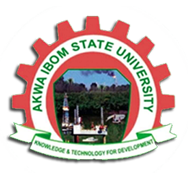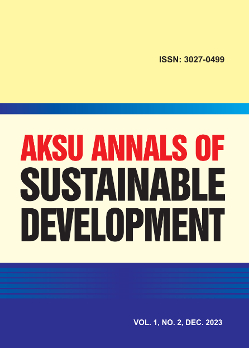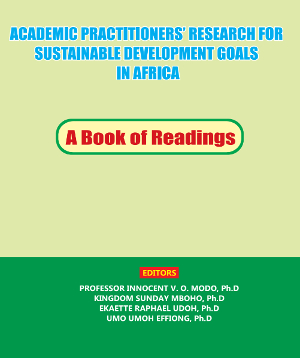CORRUPTION IN EDUCATION SECTOR AND ECONOMIC DEVELOPMENT OF AKWA IBOM STATE
https://doi.org/10.60787/AASD-1-1-4
Keywords:
Akwa Ibom State, economic development, education sector, CorruptionAbstract
The study employs a descriptive survey design to investigate the relationship between corruption in education sector and economic development of Akwa Ibom State. The research utilizes a mixed-methods approach, incorporating both qualitative and quantitative data collection methods, including questionnaires and oral interviews. The study population comprises individuals age 15 to 64, being 926,369 drawn from three Local Government Areas in the state. The findings reveal a significant relationship between corruption in the education sector and economic development. The study emphasizes the need for stringent measures to address corruption in the education system to foster economic growth.
Downloads
References
Agha E., Ukommi A., Ekpenyong O. and Effiong U.(2020). Establishing the Nexus between
Technical Education and Industrial Development in Nigeria. Journal of Research in
Education and Society,11(1),38-56.
Chua, Y. T. (1999). "Robbed: an Investigation of Corruption in Philippine Education". Metro
Manila: Philippines Center for Investigative Journalism.
https://www.worldcat.org/title/robbed-an-investigation-of-corruption-in-philippineeducation/oclc/43207333 (Retrieved on 10th March, 2019).
Effiong, U., Ekanem, A., and Ottong, I. (2023). Inclusive Education and Sustainable
Learning Opportunities for Persons with Disabilities in Akwa Ibom State University,
Obio Akpa Campus, Nigeria. In: Innocent V. O. Modo, Kingdom S.Mboho, Ekaette
R.Udoh and Umo U.Effiong (Eds), Academic Practioners Research for Sustainable
Development Goals in Africa ICIDR Publishing House: Ikot Ekpene.
Hallak, J. Poisson, M. (2002). Ethics and corruption in education (Policy Forum No. 15). Results
from the Expert Workshop held at the IIEP, Paris, France, 28th-29th November, 2001. Paris:
IIEP-UNESCO. file:///C:/Users/USER/Downloads/1834-1-1840-1-10-20161127.pdf
(Retrieved on 10th April, 2019).
Hallak, J. and Poisson, M. (2005). “Ethics and corruption in education: an overview”. Journal of
Education for International Development, Vol. 1(1).
https://books.google.com.ng/books?id=kcxjDwAAQBAJ&pg=PA569&lpg=PA569&dq=Ha
llak,+J.+and+Poisson,+M.+(2005).+“Ethics+and+Corruption+in+Education:+an+Overview
&source=bl&ots=UoPb2JJvKT&sig=ACfU3U3mmDrnYwLVPEoAG_3HIvbUA3Zj_A&hl
=en&sa=X&ved=2ahUKEwiyyiopuLmAhWqzIUKHVyZDyQQ6AEwBnoECAkQAQ#v=o
nepage&q=Hallak%2C%20J.%20and%20Poisson%2C%20M.%20(2005).%20“Ethics%20a
nd%20Corruption%20in%20Education%3A%20an%20Overview&f=false(Retrievedon 11th
April, 2019).
Jacob, B. and Levitt, D. (2003). "Rotten apples: an investigation of the prevalence and
predictors of teacher cheating". Quarterly Journals of Economics,Vol. 118(3), pp. 843-877.
Kochanova, A. (2015). How does corruption affect economic growth? World Economic Forum.
https://www.weforum.org/agenda/2015/05/how-does-corruption-affect-economic growth.
(Retrievedon 16th January, 2019).
Martínez, J. (2004). “Corrupción de Estado en CONALITEG. Vamos México: El Peón de la
Reina”, Benemérita Universidad Autónoma de Puebla, Puebla, Mexico.
Nguyen, N. A., Nguyen, N. M. and Binh, T. (2014). Corruption and economic growth with a
focus on Vietnam. Munich personal ResPEc Archive. https://mpra.ub.unimuenchen.de/84728/1/MPRA_paper_84728.pdf#page=4&zoom=auto,-101,721
(Retrievedon 17th January, 2019).
Oyinola, O. A. (2011). Corruption eradication in Nigeria: An Appraisal. Library Philosophy and
Practice.
Rumyantseva, N. (2005). "Taxonomy of Corruption in Higher Education." Peabody Journal of
Higher Education 80(1), 81-92.
Segal, L. (2004). "Battling corruption in America's public schools". Northeastern University
Press, Boston, MA.
Sen, A. (1983). Development: Which way now? Economic Journal, 91 (372), 745-62.
Tanaka, S. (2001). "Corruption in education sector development: a suggestion for anticipatory
strategy." The International Journal of Educational Management and Administration,Vol.
(4), pp.15-81
Transparency International (2019). Returning Nigerians' stolen millions. Transparency
International publication.
Downloads
Published
Issue
Section
License
Copyright (c) 2024 AKSU Annals of Sustainable Development

This work is licensed under a Creative Commons Attribution-NonCommercial-NoDerivatives 4.0 International License.
Manuscript content on this site is licensed under Creative Commons Licenses. Authors wishing to include figures, tables, or text passages that have already been published elsewhere are required to obtain permission from the copyright owner(s) for both the print and online format and to include evidence that such permission has been granted when submitting their papers. Any material received without such evidence will be assumed to originate from the authors.






 ICIDR Publishing House
ICIDR Publishing House